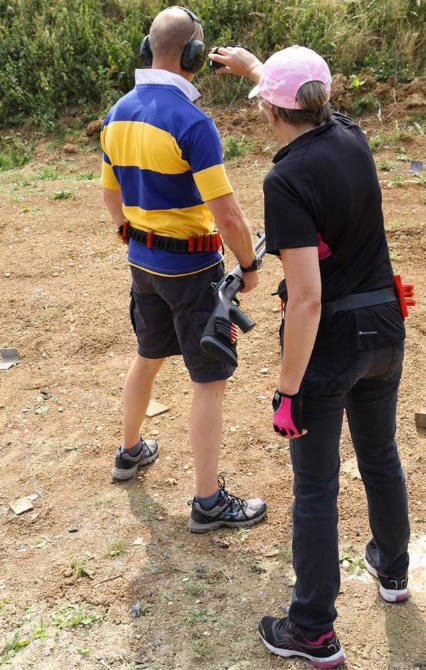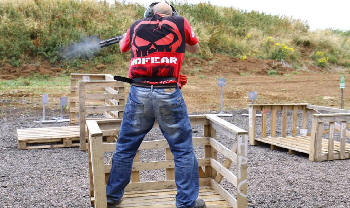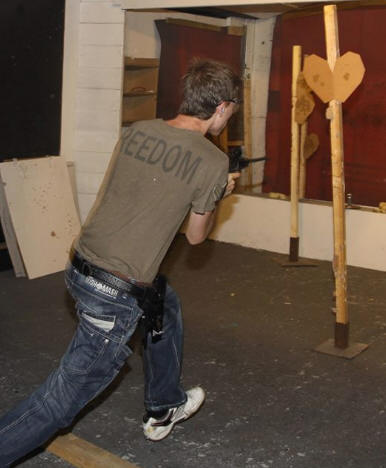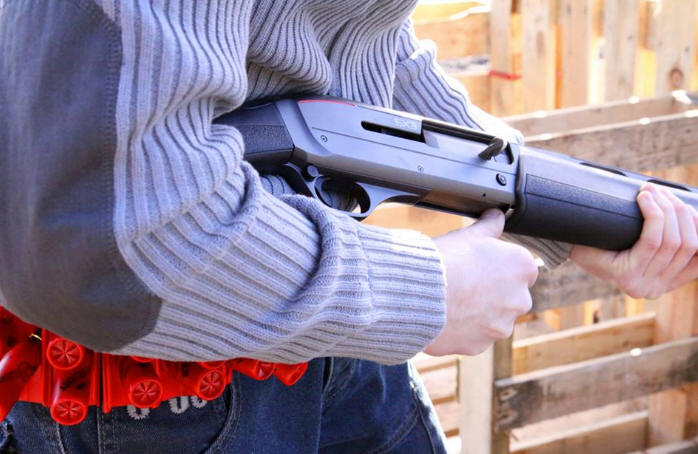Origins
The basic game originated in Southern
California in the 1950's and was known as "Leatherslap" matches. Very little was
standardized. As the game evolved it became an amalgam of many elements. Some
old-west fast draw, sometimes an obstacle course to run around and through.
|
The, International Practical Shooting
Confederation, IPSC in short,, pronounced "ip-sick", to make it even quicker to
say (coz that’s what us practical boys & girls are good at, speed is everything
you know) was created as an organization in 1976 at Columbia, Missouri, by
representatives from nine nations where the sport of "practical" shooting was
becoming popular.
As the organization grew, member nations
developed their own national sanctioning bodies to administer matches in their
own countries, and to hold their own national championships.
Since the pistol ban competitors use mainly
Rifles or Shotguns which are carried in both hands or Airsoft pistols which are
carried in belt holsters and are accompanied by spare magazines in pouches also
attached to the belt.
|
 |
The Objective
Practical shooting is a sport in which
competitors are required to combine accuracy and speed to successfully complete
many different types of shooting "problems".
Practical shooting is like no other
shooting discipline. Practical shooting tests a persons mind, body and shooting
ability. It is a great all round leveller, equally matching the young and old.
|
The events or stages shot in each practical
shooting match are different each time - which requires competitors to be
diverse in their training. At any given match a shooter may be required to shoot
targets 2 meters away in one event, and 50 meters away in the next. Sometimes
the targets are paper, sometimes they are steel. Often "no-shoot" penalty
targets are placed near "shoot" targets. Points are subtracted from a shooter's
score for hitting the "no-shoots". |
 |
A shooter runs and shoots at targets as he
makes his way through an obstacle course. Paper targets and steel plates are
engaged, rapid-fire, as moving targets are activated and drop in and out of
sight. Incredible feats of shooting skill performed at warp speed.
Multiple targets, moving targets, partial targets, knock-down targets, No-shoot
penalty targets that cover or obscure "shoot" targets, barricades high and low,
doors, windows, walls, tables and other props are blended together by our
ingenious Course Designers to create constantly changing situations that
challenge the shooter to think and shoot.
Props are used to simulate a scenario that
the shooter must complete. Shooting may be done from freestyle, strong hand,
weak hand, prone, or any other imaginable position, depending on the course of
fire.
|
Since scoring uses both total points and
elapsed time, the shooters strive to find the best combination of accuracy and
speed to win.
The obstacle course or stage must not be
confused as an assault course where all must start at point 'A' and finish at
point 'B' in exactly the same way. It’s a bit like a Map, Some take the Motor way;
fast but a longer route. Some take the winding country lanes; shorter but more wiggely. Some use a mixture of both and not to forget the ‘gameie’ who find a
short cut!
Good stages, and there are many that go
towards making a whole match, normally have a minimum of two ways of doing them,
each way will have its advantages and disadvantages and unique problems to
solve.
Practical shooting has many aspects, Its
not just about who can pull the trigger the fastest or who is the most accurate
or who can run through the obstacle course the fastest. You do not need to be an
athlete or young and fit to do well. Many older competitor or the less agile are
usually the match winners, proving that experience and practice, makes for a
winning formula. |
 |
Who would win?
Take two men of equal shooting abilities.
One can run faster than he can think, whilst the other thinks faster than he can
run.
Now introduce a third, who can neither think or run fast but has a greater
shooting ability.
Only a fool would predict a winner, however give all three a bit of practice to
hone their natural abilities and master their weaknesses and the triumphant one
would be the one that took his practice time the most seriously. However the
others will still enjoy playing the game equally.
Practical Shooting is what you want to make
of it. You can gear up and become a Serious Competitor. The choice is yours.
The sport recognizes many different aspects
of individual excellence. There is a wide diversity of attitudes among the
shooters at a match. For some, the match is part practice, part social occasion.
They enjoy the challenge, the fun and social aspects of the sport, and don't
take things too seriously. At the other end are the Serious Competitors. They
respond to the challenge by employing modern sports training techniques to
condition mind and body to peak performance. In between are all sorts of
shooters.
The principles of the sport
The following principles are established to
define the nature of practical shooting.
They are accepted by all members of the International Practical Shooting
Confederation (IPSC) as conditions of membership.
-
Practical competition is open to all
reputable persons without regard to occupation.
-
Accuracy and speed are the equivalent
elements of practical shooting and practical competition must be conducted in
such a way as to evaluate these elements equally.
-
Firearm types are not separated, all
compete together without handicap
-
Practical competition is a test of
expertise in the use of practical firearms and equipment.
-
Practical competition is diverse. Problems
are constantly changed, Courses of fire may be repeated, but no course may be
repeated enough to allow its use as a definitive measure of practical shooting
skill.
-
Practical competition is freestyle. In
essence, the competitive problem is posed in general and the participant is
permitted the freedom to solve it in the manner he or she considers best within
the limitations of the competitive situation as provided.
The Equipment Race
Some people have criticized practical
shooting for "forgetting its roots". The proliferation of "race guns", with
compensated barrels, electronic sights, and quick-release holsters, has
discouraged many competitors who cannot or do not want to get into the
"equipment race".
Many serious shooters choose to take
advantage of the freedom IPSC allows to experiment with new technologies that
can reduce muzzle flip, increase accuracy, and speed up target acquisition.
An expensive gun is not required to shoot
an IPSC match. A reliable, accurate gun, a safe holster, and spare magazines are
all you should need to get started.

|



